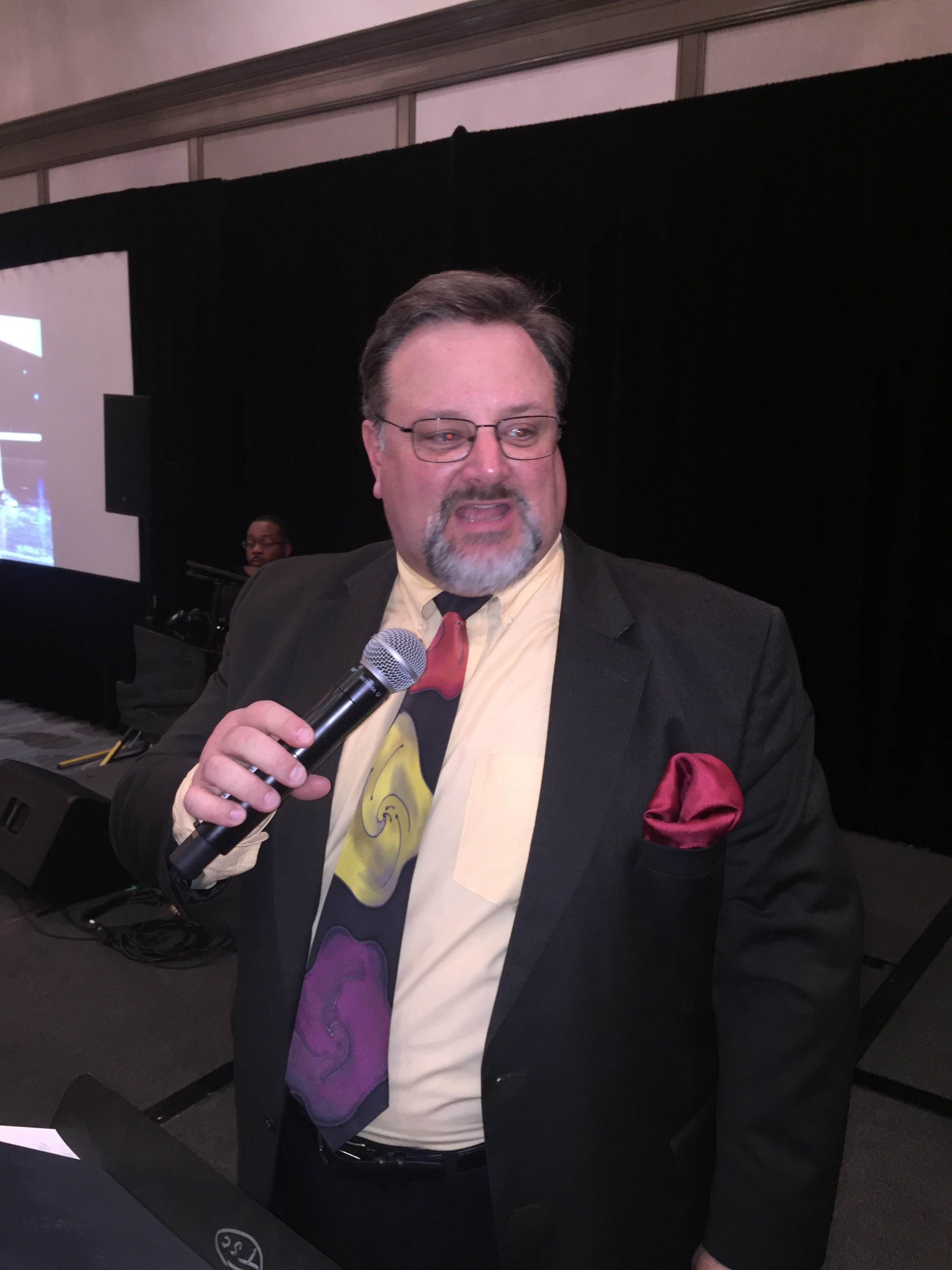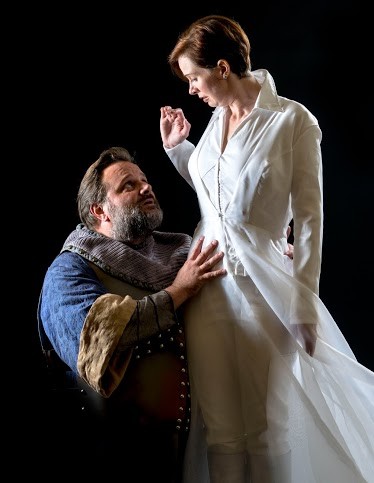Sweet are the uses of adversity/ Which like the toad, ugly and venomous/ Wears yet a precious jewel in his head;/ And this our life exempt from public haunt/ Finds tongues in trees, books in the running brooks/ Sermons in stones, and good in every thing. — William Shakespeare, As You Like It
“Sweet are the uses of adversity.”: It’s one of Shakespeare’s most famous and frequently repeated quotations. In its original context, the line is spoken by a deposed and exiled duke in the ever-popular and often relevant urban/suburban comedy As You Like It. And, although it is intended to be over-the-top and more than a touch ironical, as an enduring aphorism, it is more often used as a token of sincere comfort in troubled times.
Although the Tennessee Shakespeare Company (TSC), currently making its home in a rustic train depot on Poplar Pike in Germantown, has remained relatively healthy and viable, even in an unrelentingly tough economic climate for not-for-profit arts groups, the ambitious six-year-old company has of late experienced more than its share of adversity. So much so, in fact, that TSC’s founding director Dan McCleary, a Germantown native, has begun to wonder whether or not his dream of operating a classical theater company in his hometown can continue as is or if, like the aforementioned duke, there may be some kind of exile in his future as well.
The tragedy played itself out in June, as Shelby County’s municipalities considered the costs and ramifications of creating their own unique school systems. Germantown’s mayor and board of aldermen, looking to trim money from the city’s budget, chose by a unanimous 5-0 vote not to restore the $70,000 in funding that served as a foundation for TSC’s extensive educational programming. The money, only a fraction of the company’s annual operating costs, had in seasons past enabled the TSC to produce special student matinees and allowed up to 20 teaching artists to take Shakespeare into classrooms. That funding had been raised by appropriating a percentage of rental fees from the city-owned Germantown Performing Arts Center.
“This vote will have devastating consequences on our ability to provide education programming for students in our community,” McCleary wrote in a statement released following the city’s decision. “The impact will be felt immediately,” he concluded.
“I can’t understand why they would invest so much in something for our young people and then just stop,” McCleary says. “Especially when the investment seemed to be working so well.”
“Seventy thousand dollars is a lot of money, and it was money that we put to really good use,” he says, comparing the lost funding to the company’s broader $600,000 operating budget. “On the other hand, the grant money that has been cut was almost entirely for education. And, more specifically, it was almost entirely for education for Germantown families. So, while it is a terrible loss, it’s really more of a loss for students and for education in Germantown than it is a financial loss for us as a company. Because, if I can’t raise that money from other sources, then we just won’t offer those programs anymore.”
According to an economic impact study conducted by Christian Brothers University, the Tennessee Shakespeare Company’s presence in Germantown brings $1.2 million into the community annually. “If all you’re looking for is a dollar sign, there’s that,” McCleary says. But the actual value to Germantown and Shelby County, he insists, is more subtle and sometimes difficult to quantify.
“In our first productions, I was told by some people — and yes, by some city officials — that I didn’t want to be mixing [students from different] schools at our performances,” McCleary says, as though he might be establishing a contemporary Memphis-specific setting for Romeo and Juliet, where a feud between “two noble houses” yields a grim teenage harvest. “Of course, I took that as an invitation to mix the schools,” he says, recalling his company’s first student matinee of As You Like It, which was attended by 345 students from six Memphis, Germantown, and Bartlett schools.
The teachers had instructed their students how to behave, and throughout the first half of the play, they sat quietly with their hands in their laps appreciating the work.
“It wasn’t very Elizabethan,” says McCleary, who prefers a more communal relationship between the actors and their audiences. “Children have been told by so many adults in their lives that Shakespeare isn’t something that they’ll understand, but they should go anyway because ‘it’ll be good for you.'”
Since As You Like It, TSC’s productions have often been immersive and environmental. During that first matinee, when the play’s lead characters left the court for the Forest of Arden, the audience was instructed to follow the actors out of St. George’s Episcopal Church and into a wooded area nearby. The kids, of course, ran. And when they regrouped in the great outdoors, they were no longer separated by geography or architecture. They mixed organically and were no longer passive observers grouped by individual schools with various pecking orders. They were active participants in the drama.
“It was something to see,” says McCleary, who describes perceived differences in the urban and suburban students as “ludicrous.”
TSC’s educational arm played a much greater role in audience development than anybody involved with the fledgling company anticipated.
“Children would see our shows, then they’d go home and say they wanted to come again. And then they’d bring their parents to our evening performances,” McCleary says. “We developed our audience, because teenagers would bring their parents. And now, of individuals who are also supporters, 55 percent of them are parents who came to us, because their children brought them.”
The unforeseen impact on audience development encouraged TSC to go into the schools more and to seek more state and federal funding to create opportunities for underserved communities.
“That’s not the same as underprivileged,” McCleary clarifies. “But there haven’t been a lot of professional classical opportunities for students. And now [in a season] we can readily count on 80 or 90 schools and over 15,000 students. And that’s just here in Shelby County. That doesn’t include Arkansas, Mississippi, or the rest of the state.”
The multiple educational components TSC programmed around its shows caught the attention of the National Endowment for the Arts. As soon as Germantown announced that it was cutting the company’s civic funding, the TSC became one of 40 American companies awarded a $25,000 matching grant from the NEA, through ArtsMidwest and the Shakespeare in American Communities Initiative.
The $25,000 was quickly matched, but that money is specifically earmarked to take something called the Romeo and Juliet Project into underprivileged communities.
The Romeo and Juliet Project, initially launched thanks to the generosity of the city of Germantown and since expanded via ArtsMemphis to include three Memphis City Schools, is a program designed to introduce students to Shakespeare in a theatrical, rather than literary, context.
“We know Romeo and Juliet is a part of every incoming freshman’s curriculum,” McCleary says. “It’s in the English department, not the art department. Nevertheless, you’ve got all these children reading, so we thought that if these actor-teachers could be the first to introduce Shakespeare to these ninth graders, it could really turn them on to Shakespeare. And, because this is Romeo and Juliet, in certain schools we could address pressing current social issues having to do specifically with violence and the death of peers. This was a way to get young people on their feet and talking.”
McCleary is transparent and can be outspoken.
“What we do is expensive,” he says, running down a list of expenses, from recruiting talent to creating costumes to renting facilities and equipment to engaging professional unions.
“A lot of people think this is a theater town, but it’s not,” he says, only slightly overstating his case. “People don’t move here to make a living in the theater; they move away. So we either need to be training constantly or we need to be going out of town and bringing in new talent,” McCleary says. “And I insist on paying everyone.”
When a company member asks McCleary if it really costs $100,000 to produce The Taming of the Shrew, he answers unhesitatingly in the affirmative and lists expenses.
At a time when many donor-dependent organizations are struggling, the TSC has managed to grow its earned-to-donated revenue ratio to more than 40 percent earned.
“And that’s not because donations are down,” McCleary says. “We’ve grown every year.”
In spite of this relative stability and proven nimbleness, there’s still not a lot of room in the budget for shuffling funds when disaster strikes.
“We spend a lot of time producing theater in places where theater was never intended to be produced,” McCleary says, describing a costly proposition that has resulted in extraordinary artistic opportunities and interesting partnerships with the Dixon Gallery & Gardens, the IRIS orchestra, and Shelby Farms park. The opportunities to perform in multiple locations in Germantown, but also at locations throughout Shelby County, have also created identity issues for a new company. McCleary thinks it’s time for the TSC to start seriously thinking about a permanent home. But where?
“Because we did this in Germantown, people in Memphis question whether it’s a Memphis thing,” he says, explaining his ongoing conundrum. “And when we perform in Memphis, people here question whether or not it’s a Germantown thing.”
At one time, McCleary’s proposal to create an art park and amphitheater behind the Morgan Woods Theater on Poplar Pike seemed to be moving full steam ahead. The city spent $55,000 to research the project. The TSC spent an additional $20,000. Designers were chosen, and it seemed as though McCleary’s long-range plans to create a permanent home would be realized. Only, they weren’t.
“We were told, among other things, that our design wasn’t green enough,” McCleary says with a sigh. “And this brings us back to one of the original questions: Can the Tennessee Shakespeare Company remain in Germantown?”
McCleary says the answer is a qualified yes.
Since the vote to eliminate its education grant, Germantown has made provisions to provide the TSC with roughly $13,000 worth of in-kind facility rental at GPAC, and that helps.
“For the past five years, the city of Germantown has helped us raise our baby,” McCleary says. “I hate to see them leave us, if that, in fact, is what’s happening.”
Since the funding cut, McCleary has received what he describes as an “inordinate” number of invitations to look at facilities outside of Germantown.
“The locations have ranged from Bartlett to Collierville to downtown to Midtown to East Memphis. Some of the locations have been theaters. Some of them are empty spaces. Some of them are empty spaces that are about to get really active.”
McCleary says he’s in conversations with numerous parties, including developer Bob Loeb, who is currently rebranding Midtown’s Overton Square as a theater and restaurant district.
“We’ve expanded our board by six people, and many of them are there because of they have facility and planning expertise,” McCleary says. “So we will continue having these conversations over the course of the balance of this calendar year.”
Only time will tell how sweet are the uses of such adversity.
The Tennessee Shakespeare Company Launches its Sixth Season
The Tennessee Shakespeare Company’s sixth season includes one comedy, one tragedy, a back-by-demand Christmas show, and an original script, inspired in part by recent events.
Unto the Breach! The Un-Common Courage of William Shakespeare is an original compiled script that was added as a substitute for TSC’s usual full-cast fall production. The two-performance show in the 824-seat Germantown Performing Arts Center/Duncan-Williams Performance Hall is a benefit to help restore education funding to the community’s classrooms. Ticket revenue will go to TSC’s education program. The original script will feature TSC founding director Dan McCleary and resident artist/education director Stephanie Shine onstage together for “a 90-minute exploration of Shakespeare’s courage.” Scenes will be performed from Richard III, King Lear, Love’s Labor’s Lost, Twelfth Night, Coriolanus, The Merchant of Venice, The Winter’s Tale, Macbeth, As You Like It, and more.
The show plays September 7th and September 10th. A special all-school matinee with discounted tickets will be made possible by TSC’s sponsors on September 10th at 10:30 a.m. at GPAC.
Other season offerings include It’s a Wonderful Life: A Live Radio Play in December in the Winegardner Auditorium at the Dixon Gallery & Gardens; Romeo and Juliet in January at the Germantown Performing Arts Center/Duncan-Williams Performance Hall; and The Taming of the Shrew in April in the Dixon’s Winegardner Auditorium.
 Michael Donahue
Michael Donahue  Photo: Joey Miller.
Photo: Joey Miller. 